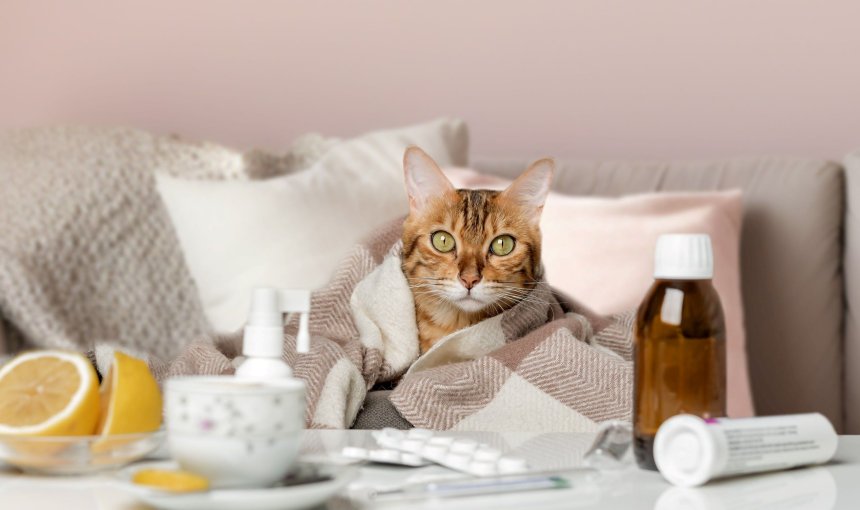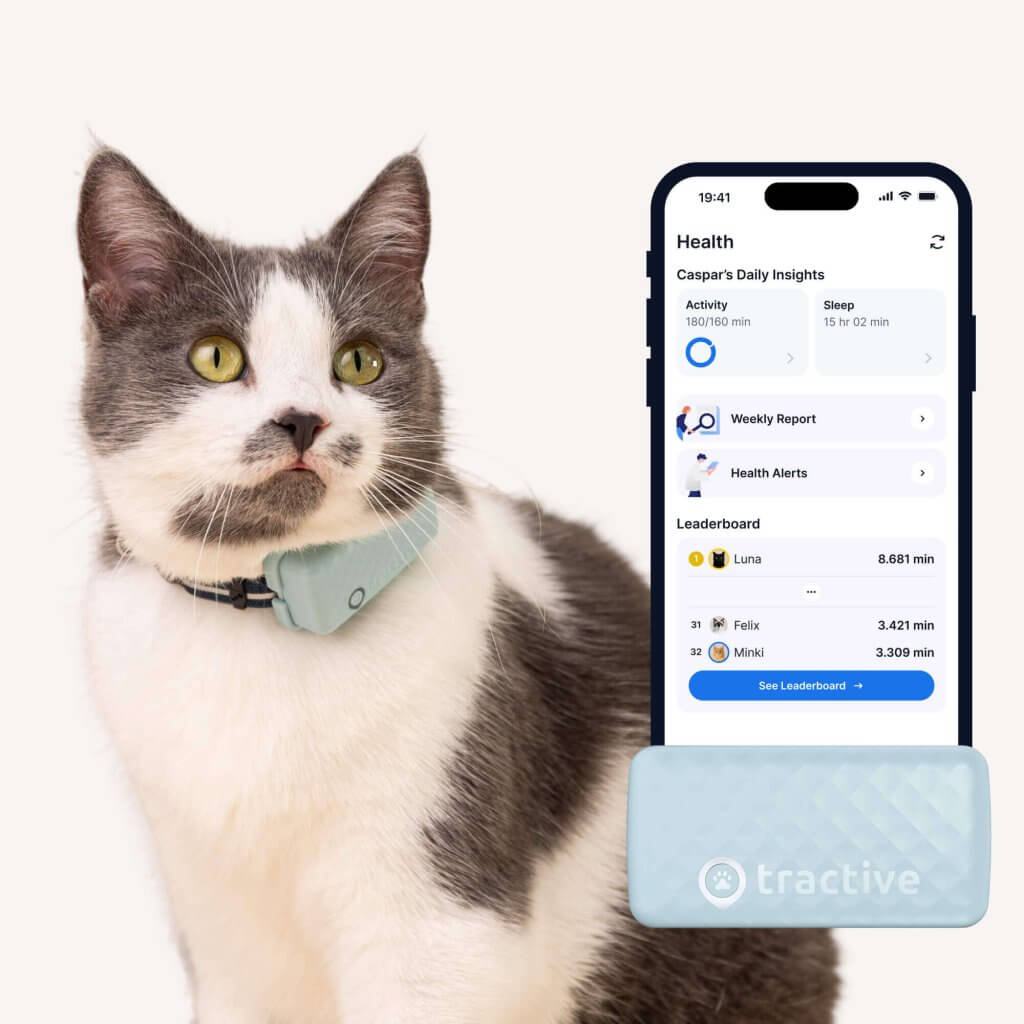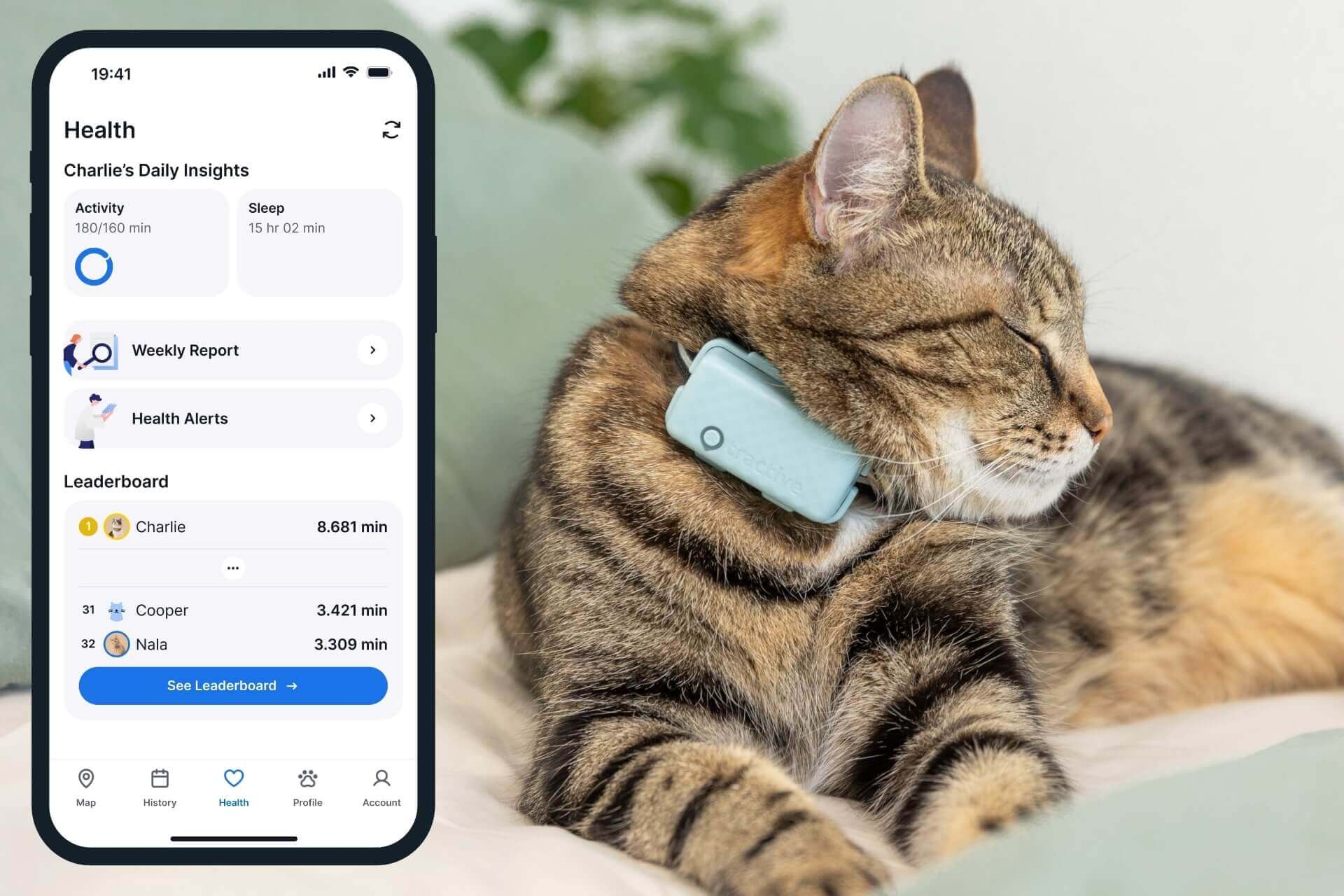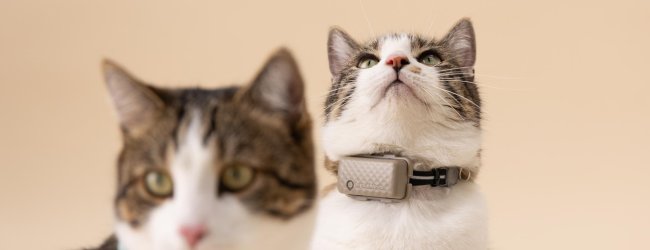 Approved by Dr. Dwight Alleyne, DVM
Approved by Dr. Dwight Alleyne, DVM Why Is My Cat Sneezing?
From serious illnesses to more minor causes, here's why your cat is sneezing - and what you can do to prevent it.

Ever heard a distinctly…feline-sounding “Achoo!” and looked over and found your cat was the culprit? Wondering: why is my cat sneezing? While a few cat sneezes here and there are no big deal, but excessive sneezing in cats can signal something’s wrong. Here are the potential reasons for a cat sneezing, how you can help your kitty avoid illness, and how monitoring your cat’s health with a dedicated pet tracker is a solution.

Find out where your cat spends their time.
Read more- Why do cats sneeze? Is there a pattern?
- Is it normal for my cat to sneeze multiple times in a row?
- Why is my cat sneezing? The main causes & culprits
- How can you tell if your cat’s sneezing or not?
- Cat sneezing too much? What to do
- How do you treat a sneezing cat?
- Where a cat GPS & Health tracker can help
Why do cats sneeze? Is there a pattern?
Just as in humans, cat sneezing may occur when their noses becomes irritated by particles in the air – or by a virus. During a sneeze, air is forced out of the nose, whisking away the annoying irritant. But watch your cat closely – their sneeze may not be a sneeze! Your cat may be:
- Coughing
- Gagging
- Reverse sneezing
- Hiccupping
- Or even retching
💡 So before you seek treatment for your cat’s sneezing issues, make sure they’re actually sneezing. Take a video of the sneezing episode to show your vet to help them understand the problem.
It’s also helpful to keep an eye out if there’s a pattern to your cat sneezing. Does it happen at the same time every day? Does your kitty always sneeze upon entering a certain room in your house? All these factors can help narrow down the cause.
Is it normal for my cat to sneeze multiple times in a row?
An occasional sneeze is most likely nothing to worry about. But what if your kitty has a sneezing fit and sneezes three, four, or more times in a row? That’s normal too. Just keep an eye on your furball to see if the sneezing increases or persists for several days.
Why is my cat sneezing? The main causes & culprits
Once you know when, where, and how often your cat’s sneezes are happening, it’s time to figure out why your kitty is sneezing. Some of the most common upper respiratory infections in cats are caused by viruses, affecting cats like the common cold in humans. These can range from mild to severe. Like, for example:
- Feline Herpesvirus 1 (FHV-1)
Which might cause sneezing, nasal discharge, coughing, and conjunctivitis. Seasonal changes, stress and other factors can spur a flare-up. It’s rarely cleared away from the body entirely, but rather lies dormant. - Feline Immunodeficiency Virus (FIV)
Which attacks and weakens your cat’s immune defenses. On the bright, only a small percentage of cats show exposure to the virus. Humans also cannot be infected by FIV. The virus passes from cats through bites that break the skin. - Feline Calicivirus
Highly contagious, this virus can also cause inflamed gums in cats or even limping due to joint inflammation.
Besides viruses, your cat sneezing might also result from:
- Nasal and sinus issues
From the inflammation of the tissues lining these areas, causing your cat to have a “stuffy nose.” Your cat will probably have eye and nose discharge and may paw at their face. - Chronic upper respiratory conditions
When your cat sneezes very often every single day for weeks, they may be experiencing a chronic upper respiratory condition. This often means that their nasal passages and immune system have been damaged or weakened from previous infections. Sadly, these conditions don’t resolve on their own and need lifelong vet support. - Allergens
Your cat’s nasal passage might be irritated by particles in the air, scented household items like perfume, mold, pollen, dust, or even smoke. All of which can cause them to sneeze as a reaction. - Foreign material
Like grass or clumps of dirt which may lodge in your cat’s nose. Sneezing is how their body tries to expel it naturally. Foreign material lodged in the nose can cause a breathing blockage. - A tooth infection
The roots of your cat’s teeth are right beside their nasal passages. So any infection of their teeth can pass on to their nose as well. Or if a tooth is infected, it can drain into the sinuses – and cause sneezing. - Bacterial infections
Which might result from viral infections. When there’s fluid trapped in your cat’s sinuses, bacteria can also grow in that fluid and cause inflammation and infection. - Fungal infections
From fungi like cryptococcus, which can grow in your cat’s nasal passages and cause sneezing. - Nasal tumors
Which are unlikely, but older cats are more at risk. Watch out for noisy breathing, sneezing, and nasal discharge. - Feline leukemia
Which might mimic an upper respiratory infection, resulting in coughing, sneezing, lethargy, and a loss of appetite.

Get health alerts for your cat
Our cats can’t always tell us if something’s wrong. But if their tracker detects unusual changes in their routine, you’ll get an alert, helping you catch potential issues early.
How can you tell if your cat’s sneezing or not?
First, take some time to observe your cat closely and note how frequently they sneeze, if there’s nasal discharge, or eye discharge. If sneezing episodes sound unusual, take a video so your vet can see and hear your cat sneezing.
Next, pay attention to your cat’s sleep. If they breathe more rapidly when asleep or relaxing, they may be coming down with a virus.
Finally, make an appointment with your veterinarian to review what you’ve observed and explain all of your cat’s symptoms.
Cat sneezing too much? What to do
If you worry that your cat is sneezing too much, take a closer look. Does your kitty show other symptoms, like eye discharge or a runny nose? Are they eating less, or are they lethargic? It’s all of these symptoms together that may signal a problem to the veterinarian. Else, a few sneezes a day are nothing to worry about in the absence of other symptoms.
Head over to your vet right away if you notice:
- Nasal discharge
- Abnormal breathing or difficulty breathing
- Eye discharge
- Fever
- Loss of appetite
- Pawing at the face
- Breathing rapidly during sleep
How do you treat a sneezing cat?
Your vet may take some samples and run a few tests to try and determine the cause of your cat’s sneezing. There are a few non-medication options for treating the symptoms of stuffy nose and upper respiratory infections in cats. Including:
- Nasal lavage
Here, the cat is placed under anesthesia and a sterile fluid is used to flush out the nasal passages. This procedure can help dislodge a foreign body, or provide relief from congestion. - Humidifier
Which can provide some relief from sneezing and congestion, in cold and dry weather. Most drug stores have humidifiers you can place where your cat sleeps. It can help thin the mucus in your cat’s nasal passage, allowing it to drain away more readily.
Where a cat GPS & Health tracker can help
When your cat starts sneezing more than usual, it can be tricky to pinpoint the cause – especially if they spend time outdoors or have a busy home life. That’s where a cat GPS and Health tracker can be an extra pair of eyes on them throughout the day. Strapped to your cat’s collar, you can now:
- Figure out your cat’s favorite spots
From your cat’s Location History. Whether it’s to hunt, explore, or just hang out – you’ll be able to tell whether these are in any pollen-riddled areas, or anywhere your cat might pick up any outdoor allergens or come in contact with other animals. - Keep constant tabs on your cat’s whereabouts – in real-time
With LIVE mode, so you know exactly where your cat is exploring. Plus, unlike the AirTag, Tractive devices work with GPS – no need for a network of compatible devices to work. - Pick up on an underlying illness much in advance
From your tracker’s Health Monitoring features. If there’s a weird drop in your cat’s active minutes or a change in their sleeping patterns, your tracker sends you a Health Alert. So you can get an early warning to bring them for a checkup at the vet – with data at hand.

All this in one device – built with love for cats and for your peace of mind as a cat parent.
Your furry friend’s health and wellbeing means as much as to us as it does to you. So we’ve made it a priority to only share medically-relevant content on our blog. This post was checked, double-checked, and medically verified by Georgia-based vet, Dr. Dwight Alleyne.

Dr. Dwight Alleyne, DVM
Originally from Long Island, New York, Dr. Alleyne began his career at a no-kill animal shelter before becoming a licensed veterinary technician. He graduated from Cornell University Veterinary College in 2006 and completed an internship at Purdue University. Now practicing in Georgia, Dr. Alleyne specializes in soft tissue surgery and ultrasounds. He also writes pet health articles on his website, “The Animal Doctor Blog” (www.anmldrblog.com).



